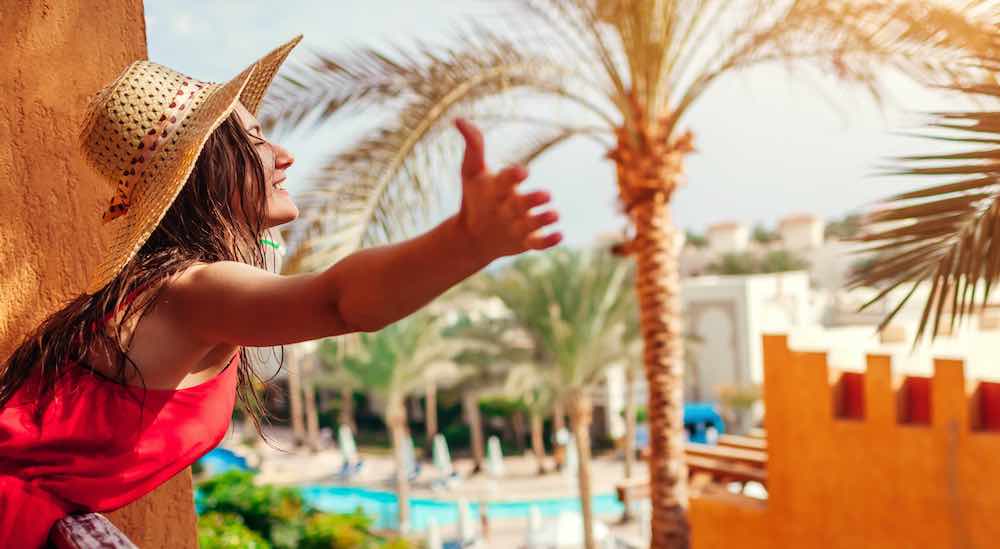A trip to Egypt is truly a bucket list trip of a lifetime, so planning the right time to go can ensure that your trip maximized to be as amazing as it can possibly be. That’s why planning for and around weather can be critical to making sure you have a great experience when you finally arrive.

Egypt is obviously a hot country because, well, it’s Egypt. But the summers can just be unbearably hot in some places, like down south in Luxor where the tombs and temples are, and tolerable farther up north in Cairo and Alexandria and along the coasts. If you can, I’d generally recommend avoiding June, July, and August. If your choice is between going during one of those months and not being able to go, then definitely go. But plan appropriately so that you avoid the worst of the sun and heat.
For example, if you find yourself down south in Luxor visiting the tombs and temples during the summer months, you’ll want to go out of your way to wake up super early and get to the sites the minute they open so that you can explore them before the day gets too hot. In the fall and winter you can sleep in later and go later in the morning and early afternoon and it’ll be warm but not scorching like in the summer. You can still do Egypt during the hot months, but you just have to plan around the worst of the heat and take extra precautions.
Pretty much any other month is fine weather-wise. Obviously, the fall and spring will still be a bit hot, and the dead of winter can be a little cool sometimes in the north, even cold at night. It rarely rains there, so no need to worry about that. It happens on occasion, but not enough to pack an umbrella or anything like that.
When I first lived there in 2003, I was riding horses in the desert behind the Pyramids one day (I used to love to ride horses out in the desert for fun and to clear my mind after a stressful week or month there) and it actually started to rain on us. And then, believe it or not, it actually started to sleet on us – hard. We literally had to take our horses up to the pyramids complex and huddle up beside one of the smaller queens pyramids to shield ourselves from the sideways sleet for about 10 minutes until it stopped. It was the most bizarre thing, but I kid you not it actually sleeted on us at the Pyramids once.
And there was another time a few years ago when it snowed in Cairo and the Pyramids and Sphinx had a very light coating of snow on them for a little while. You can google photos of it and it’s really neat to see. It snows there so rarely that I think most Egyptians alive at that point had maybe only seen snow once before there in their lives… and by snow I mean like a few snowflakes forming a very very thin layer. Not like an all-out snowfall by any means.
Ok so you’ll ideally want to avoid the height of summer if you can, but if not that’s ok too. The only other time I’d recommend trying to avoid if you can is Ramadan. Ramadan is like Christmas for the Islamic world. It’s very different in origin and meaning, but the time of year for the holy month of Ramadan – yeah it’s a whole month – is similar to the festive atmosphere of Christmas in the Western world. And that includes shops closing and special store hours and such too.
Most Muslims fast during the day during Ramadan, so demand for food drops off drastically. As a result, a lot of restaurants will close or alter their hours to sync up with decreased demand. After the sun goes down though, the feasting commences and you can usually find plenty of grub at night. But because it’s a strange time schedule-wise and things like sites and shops will close early and have odd hours, it’s generally best to try to avoid it if you can.
The exact dates for Ramadan change from year to year because the holiday actually shifts about 11 days earlier every year, so you’ll have to google it to be sure when it is in the year you’re looking at. Right now it’s generally during early summer and within a few years it’ll be in late spring and it’ll continue to shift earlier and earlier until it’s occurring during winter again eventually.
If you do go during Ramadan, though be prepared for a really festive atmosphere with lots of lights and decorations just like Christmas in the West. Oh, and when Christmas time does come around, you’ll actually see a lot of hotels and businesses in Egypt decorating for that holiday too, since about a tenth of the population is Christian and since so many foreigners who celebrate Christmas live in and visit Egypt. So don’t be surprised if you’re there in December and see Christmas trees up in some places.
How’s that for tolerance and acceptance for ya? Can you imagine public places in the United States and the UK and Germany and Spain actually decorating for a minority holiday like Ramadan? Hell naw! But in Egypt, you’ll see many businesses putting up decorations to honor and celebrate Christmas for Egypt’s minority Christian population and it’s just an accepted tradition.
Egypt is full of little surprises like that which are contrary to the many stereotypes that plague Western minds about Egypt and the wider Middle East. And that’s yet another reason to come explore this amazing place and see what life-changing and mind-changing experiences are in store for you when you get there.



